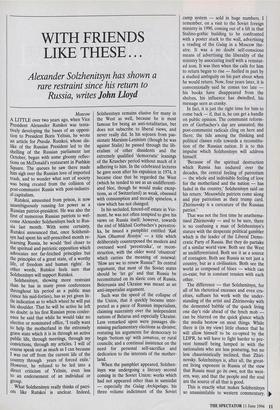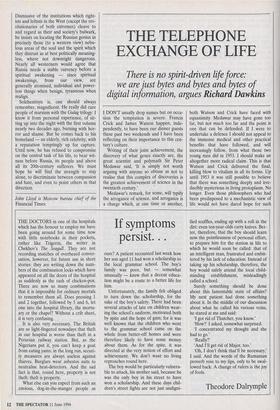WITH FRIENDS LIKE THESE . .
Alexander Solzhenitsyn has shown a rare restraint since his return to Russia, writes John Lloyd
Moscow A LITTLE over two years ago, when Vice President Alexander Rutskoi was tenta- tively developing the bases of an opposi- tion to President Boris Yeltsin, he wrote an article for Pravda. Rutskoi, whose dis- like of the Russian President led to the shelling of the Russian parliament last October, began with some gloomy reflec- tions on McDonald's restaurant in Pushkin Square. The queues he saw there made him sigh over the Russian love of imported trash, and to wonder what sort of society was being created from the collision of post-communist Russia with post-industri- al capitalism. Rutskoi, amnestied from prison, is now unambiguously running for power as a Russian patriot-president. He was also the first of numerous Russian patriots to wel- come Alexander Solzhenitsyn back to Rus- sia last month. With some certainty, Rutskoi announced that, once Solzhenit- syn had spent his self-prescribed month re- learning Russia, he would 'feel closer to the spiritual and patriotic opposition which advocates not far-fetched principles but the principles of a great state, of a worthy life, of freedom and human rights'. In other words, Rutskoi feels sure that Solzhenitsyn will support Rutskoi. Solzhenitsyn, showing more restraint than he has in many press conferences throughout his period as a public man (since his mid-forties), has as yet given lit- tle indication as to which wheel he will put his shoulder. That he will be active he left no doubt: in his first Russian press confer- ence he said that while he would take no elective or nominated office, 'I really want to help the motherland in the extremely grave state which it is in through an active public life, through meetings, through my convictions, through my articles. I will of course speak out as much as I can because I was cut off from the current life of the country through years of forced exile.' However, he refused to be led into a direct criticism of Yeltsin, even less to an endorsement of an individual or group.
What Solzhenitsyn really thinks of patri- ots like Rutskoi is unclear. Indeed, Solzhenitsyn remains elusive for many in the West as well, because he is most famous for being an anti-totalitarian, but does not subscribe to liberal views, and never really did. In his sojourn from pas- sionate Marxism-Leninism (though he was against Stalin) he passed through the lib- eralism of other dissidents and the extremely qualified 'democratic' leanings of the Kruschev period without much of it adhering to him. In the celebrated lectures he gave soon after his expulsion in 1974, it became clear that he regarded the West (which he tended to see as an undifferenti- ated bloc, though he would make excep- tions, as of Switzerland) as weak, obsessed with consumption and morally spineless, a view which has not changed.
In his secluded, fenced-off estate in Ver- mont, he was not often tempted to give his views on Russia itself; however, towards the end of Mikhail Gorbachev's perestroi- ka, he issued a pamphlet entitled 1Cak Nam Obustroit Rossiyu' — a title which deliberately counterposed the modern and overused word 'perestroika', or recon- struction, with the older word `obustroif which carries the meaning of renewal: `How are we to renew Russia?' Its central argument, that most of the Soviet states should be 'let go' and that Russia be reconstituted on its slavic core of Russia, Belorussia and Ukraine was meant as an anti-imperialist argument. Such was the speed of the collapse of the Union, that it quickly became inter- preted as a piece of Russian imperialism, claiming suzerainty over the independent nations of Belarus and especially Ukraine. Less remarked upon were passages dis- missing parliamentary elections as divisive; restating his arguments for democracy to begin `bottom up' with zemstvos, or rural councils; and a continual insistence on the need for personal self-sacrifice and dedication to the interests of the mother- land.
When the pamphlet appeared, Solzhen- itsyn was undergoing a literary second coming in the Soviet Union: works which had not appeared other than in samizdat — especially the Gulag Archipelago, his three volume indictment of the Soviet camp system — sold in huge numbers. I remember, on a visit to the Soviet foreign ministry in 1990, coming out of a lift in that Stalino-gothic building to be confronted with a poster stuck to the wall, advertising a reading of the Gulag in a Moscow the- atre. It was a no doubt self-conscious means of advertising the liberality of the ministry by associating itself with a reinstat- ed icon. It was then when the calls for him to return began to rise — fuelled in part by a studied ambiguity on his part about when he would return. Now, four years later, it is conventionally said he comes too late — his books have disappeared from the shelves, his influence has dwindled, his message seen as cranky.
In fact, it is just the right time for him to come back — if, that is, he can get a handle on public opinion. The communist reform- ers of Gorbachev's day are unseated; the post-communist radicals cling on here and there; the tide among the thinking and political classes rolls towards a reconstitu- tion of the Russian nation. It is to this impulse which Solzhenitsyn will address himself.
`Because of the spiritual destruction which Russia has endured over the decades, the central feeling of patriotism — the whole and indivisible feeling of love for the motherland and the nation — has faded in the country,' Solzhenitsyn said on his return: `Meanwhile patriots come along and play patriotism as their trump card. Zhirinovsky is a caricature of the Russian patriot.'
That was not the first time he anathema- tised Zhirinovsky — and to be sure, there is no confusing a man of Solzhenitsyn's stature with the desperate political gambler which is the leader of the Liberal Demo- cratic Party of Russia. But they do partake of a similar world view. Both see the West as undifferentiated. Both see it as a source of contagion. Both see Russia as not just a country, but as a civilisation. Both see the world as composed of blocs — which can co-exist, but in constant tension with each other.
The difference — that Solzhenitsyn, for all of his rhetorical excesses and even cru- elties, suffuses his work with the under- standing of the artist and Zhirinovsky with the demented babble of the quack living one day's ride ahead of the lynch mob can be blurred on the quick glance which the media bestow on most things. While there is (in my view) little chance that he will allow himself to be co-opted by the LDPR, he will have to fight harder to pre- vent himself being lumped in with the nationalists who are less posturing, but no less chauvinistically inclined, than Zhiri- novsky. Solzehnitsyn is, after all, the great- est living exponent in Russia of the view that Russia must go its own, not the west- ern, way, and that the people and the soul are the source of all that is good. This is exactly what makes Solzhenitsyn so unassimilable to western commentary. Dismissive of the institutions which right- ists and leftists in the West (except the rev- olutionaries of both extremes) cleave to and regard as their and society's bulwark, he insists on locating the Russian genius in precisely those (to a western view) nebu- lous areas of the soul and the spirit which they distrust as at best politically meaning- less, where not downright dangerous. Nearly all westerners would agree that Russia needs a stable currency before a spiritual awakening — since spiritual awakenings, from our view, are generally atomised, individual and power- less things when benign, tyrannous when malign.
Solzhenitsyn is, one should always remember, magnificent. He really did cure people of marxism with the Gulag trilogy: I know it from personal experience, of sit- ting up into the night with the first volume nearly two decades ago, burning with hor- ror and shame. But he comes back to his homeland — an elderly, rich celebrity, with a reputation temptingly up for capture. Until now, he has refused to compromise on the central task of his life, to bear wit- ness before Russia, its people and above all its 20th-century sufferers. We must hope he will find the strength to stay alone, to discriminate between compassion and hate, and even to point others in that direction.
John Lloyd is Moscow bureau chief of the Financial Times.



































































 Previous page
Previous page